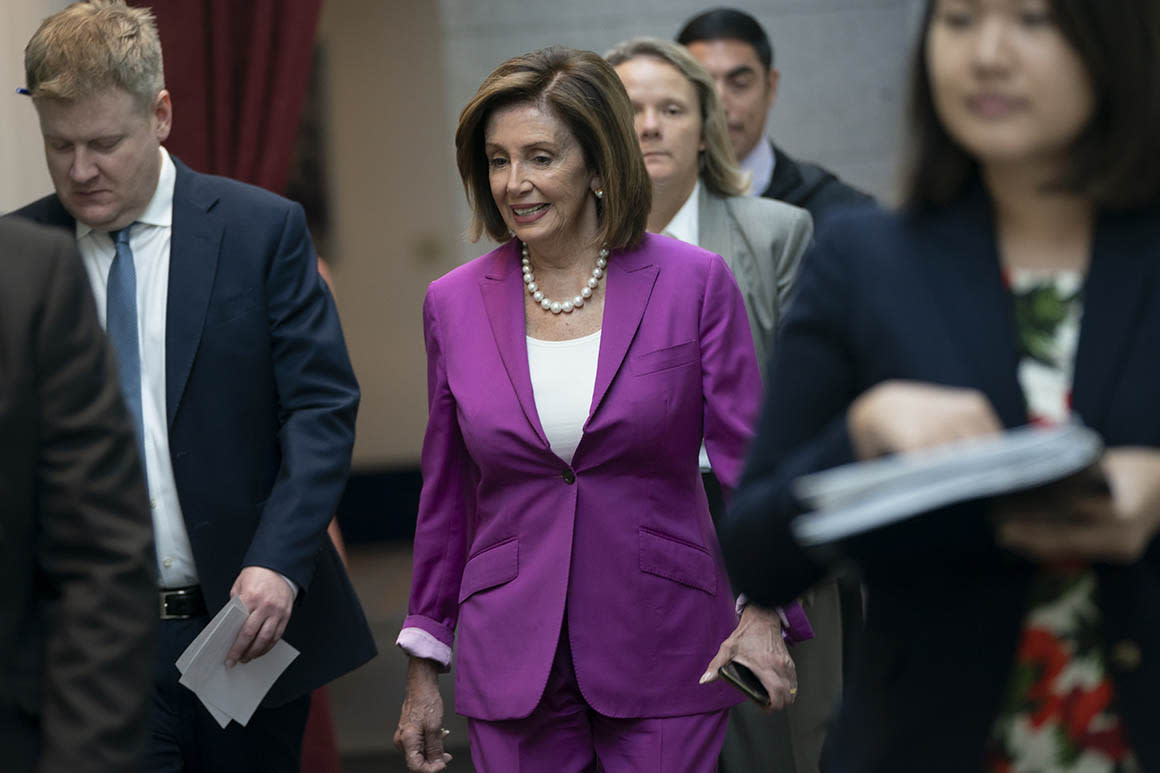White House, Congress getting closer on budget deal

White House officials and congressional leaders are drawing closer to a two-year budget agreement that also raises the debt ceiling, although both sides caution that some serious obstacles remain to a deal.
Speaker Nancy Pelosi (D-Calif.) and Senate Minority Leader Chuck Schumer (D-N.Y.) emerged from a 45-minute meeting on Wednesday optimistic they can reach an agreement this week. Pelosi and Schumer spoke on the phone with Treasury Secretary Steven Mnuchin during the session. Mnuchin, who is leading the budget talks for the White House, is attending a G7 finance ministerial meeting in France.
"If we're going to act by next Thursday, which is what we'd like to do to honor regular order, we have to get something soon so we can post with enough time," Pelosi told reporters. The House is scheduled to adjourn next week for the August recess.
“We were on the phone with Mnuchin and we’re making progress," Schumer added. " I’m very hopeful, ok? That’s all I can say.”
Mnuchin and Pelosi have been holding daily discussions for the last week and are set to talk again Thursday.
Pelosi later reiterated that she wants to pass the deal next Thursday to give the Senate enough time to act before the summer recess. Speaking at her weekly press conference, Pelosi said she aims to have a final deal written up by Friday night, in line with House rules to release text ahead of the vote.
But a senior administration official warns that optimistic statements coming from Pelosi and Capitol Hill don't mean the White House is ready to sign off any proposal, especially if there are no offsets for additional spending or restrictions on future funding.
White House officials and GOP leaders want limits on "poison pill" amendments offered by Democrats in the individual spending bills.
“Pelosi’s new timeline sounds like happy talk from the speaker who has been absent from talks for the last three months and now is trying to create momentum after a bad couple weeks between the supplemental debacle and 'the squad,'" said the official, referring to a band of upstart young Democrats who have clashed with Pelosi. "The reality is, we have a way to go.”
Any agreement would raise discretionary spending caps for the next two years, as well as boost the debt limit. Mnuchin has warned that the Treasury Department will reach its borrowing limit in early September, raising the urgency for a deal before Congress leaves town.
Democrats have demanded any increases in Pentagon spending be matched with a similar increase in domestic programs. Pelosi also wants an extra $22 billion for veterans programs that Congress has long been punting how to pay for. The White House and GOP leaders on Capitol Hill are demanding some offsets to the new spending, which Democrats don't favor. Recent projections show the federal deficit will be roughly $1 trillion this year.
Asked about possible complications to a deal, Pelosi replied: "It’s all about money, right?"
On the veterans funding, Republicans want to use Congress’s regular budget for domestic programs. But Democrats argue it would shortchange other departments.
"We don’t want the veterans resources to be competing with each other, or be competing with other very valuable domestic priorities," Pelosi said Wednesday, adding: "I think we are understanding each other,"
Sarah Ferris and Caitlin Emma contributed to this story.

